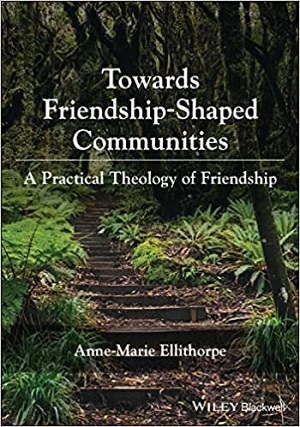
Anne-Marie Ellithorpe has just written ‘Towards Friendship-Shaped Communities: A Practical Theology of Friendship.’
Creating Conversation is a weekly editorial, curated by the Centre for Missional Leadership, that gives opportunity for people to speak about issues they believe are vital for the church in Vancouver.
One of the goals of this weekly article is to spark dialogue – and action.
We invite you to join the dialogue here on the Church for Vancouver website. We also invite you to use the article as a discussion starter with your small group, church staff, friends and your neighbours. Thanks for participating in the conversation!
As we seek to be the Church for Vancouver, we urgently need to rekindle a deep appreciation for the personal, civic and ecclesial importance of friendship.
Although friendship currently tends to be viewed as a private and recreational relationship, it has civic and spiritual dimensions and is relevant not only to our personal lives, but also to our faith communities, and to the broader community.
Yet each of these dimensions of friendship has been challenged in various ways in recent years, and practices of friendship have needed to be adapted.
What is friendship?
Friendship can be a challenging word to define. The rules and obligations of friendship vary contextually, contributing to diverse ways of being in relationship. Essentially, however, friendships are relationships of affection and reciprocity.
Reciprocity is evident in willing good for the other and in action on behalf of the other. Philosopher Simone Weil links personal friendship with a broader love as she describes friendship as consisting of “loving a human being as we should like to be able to love each soul in particular . . .” (Waiting for God, 135-36).
Civic friendship is an expression of this broader love, as it implies willing good for and being active on behalf of the broader community. Ideally there is mutuality in such attitudes and actions, but civic friendship may extend to all without full reciprocation by all.
Personal friendship
At the personal level, friendship is an important human need that for some has been thwarted during the COVID-19 pandemic.
While navigating early experiences of ‘lockdown,’ children and adults alike were reminded experientially that books, videos and the like are poor substitutes for friends. Younger and older generations discovered anew a need for the physical presence of others.
Yet at that stage of the pandemic, willing good for friends and being active on behalf of friends required, for a time, some maintaining of physical distance. Friends needed to adapt by finding alternative ways to listen, show compassion and extend hospitality to one another.
It seems that some friendships have been lost and strained due to various challenges of recent years, yet others have been made and nurtured. Friendship is an important formative relationship supported by many skills that benefit from practice, including listening, storytelling, expressing empathy and conflict resolution.
Families, extended families, educational communities, work communities and faith communities may all play a role in supporting relational skill development and creating space for the fostering of friendships.
Civic friendship
At the broader community level, civic friendship is an important component of a just and flourishing community, with genuine justice requiring trust and good will between community members.
Early responses to the COVID-19 pandemic demonstrated that crisis has the potential to provoke a greater commitment to civic friendship. We practiced civic friendship as we celebrated our health care workers and engaged in sacrificial action on behalf of the broader community, curtailing our typical activities, meeting outdoors and wearing masks indoors, to protect one another from the threat of the virus.
Some subsequent responses to the prolonged crisis were impacted by political polarization and associated perceptions of injustice.
Speaking to the ancient philosopher Aristotle’s advocacy for civic friendship in addition to justice, contemporary philosopher Sibyl Schwarzenbach identifies that “in a general atmosphere of distrust and mutual ill will, citizens may still perceive themselves to be unjustly treated even if they in fact are not so.” (On Civic Friendship: Including Women in the State, 55).
Given the ways in which friendship and justice are intertwined, all will benefit from exploring ways in which they can foster good-will within and among the broader community.
Ecclesial friendship
Friendship is integral to following in the way of Jesus, providing a model for what it means to be church and a vision for the church to live into. In the gospels of Matthew and Luke, marginalized people experienced the befriending and hospitality of Jesus.
As followers of Jesus, we are called to a life of open friendship, compassion and hospitality. We are to follow his example in laying down our lives for one another, and for our communities, in life-giving accompaniment and in life-protecting action (John 15).
Early in the pandemic, exploring alternative ways to worship together, such as meeting online or outdoors, was an expression of friendship through life-protecting action.
Yet while some faith communities discovered that meeting online provided new opportunities for inclusion and for practices of open friendship, others struggled to find ways to reflect the relational openness to which we are called amid the challenges wrought by the pandemic.
There is no ‘how-to manual’ to guide each community with their unique circumstances through the challenges of practicing open, inclusive friendship, whether through or beyond a pandemic. Valuing friendship in its various dimensions is an important place to start, as is reflecting on this oft-taken-for-granted relationship.
(My recently published book – Towards Friendship-Shaped Communities: A Practical Theology of Friendship – may prove to be a useful and timely resource for provoking further reflection on friendship.)
We are called to be a community of friends – friends of God and of one another – who, inspired and led by the Spirit, are a relational and hospitable community.
Brother John of Taizé invokes such a model in his 2012 book Friends in Christ: Paths to a New Understanding of Church. He emphasizes that envisioning the church as a community of friends is compatible with a variety of structures and provides an important perspective for considering the fruitfulness of church organization and ministries.
Friendship provides a vision for faith communities to live into. Twelfth century Cistercian monk Aelred of Rievaulx asserts that when God’s reign comes in all its fullness, the friendship to which we now admit but few “will pour out over all and flow back to God from all, for God will be all in all” (Spiritual Friendship 3:134).
We can seek now to live into this reality, despite the fragility of contemporary friendships and various factors that may thwart friendship, including challenges posed by the COVID-19 pandemic.
A community of friends in and for Vancouver
As the church retrieves a deep appreciation for the personal, spiritual, social and civic importance of friendship, leaders can support their communities in fostering civic friendship, overcoming the principle of likeness, seeking to understand each other – and each other’s practical needs – as friends and kin who are deeply connected to one another, extending friendship to those who are other and navigating the ups and downs of potentially difficult friendships, including conflict, hurt and even rejection.
Communities will need to discern whether there are specific groups that they are called to collaboratively befriend, such as shut-in elders or isolated immigrants, and – if so – how to do so in ways that promote genuine reciprocity.
 The church is called to be a relational and hospitable community on behalf of not only the world in general, but also specific geographies.
The church is called to be a relational and hospitable community on behalf of not only the world in general, but also specific geographies.
The church in Vancouver is called to be a community of friends in and for Vancouver, promoting reciprocity, valuing personal and civic expressions of friendship, and – in and beyond times of crisis – pointing toward the open welcome and hospitality of God.
A practical theologian, Anne-Marie Ellithorpe is author of Towards Friendship-Shaped Communities: A Practical Theology of Friendship, Research Associate at Vancouver School of Theology, co-chair of the Religious Reflections on Friendship seminar unit of the American Academy of Religion and Director of Educational Ministries at Richmond Presbyterian Church.
